Dates for your diary
From 22 to 26/05: Philanthropic Opening Week
27/05: Yannick Noah Day, the tournament’s charity day
05/06: World Environment Day, which will be celebrated by the tournament
09/06: All in a Wheelchair Day
The FFT has put sustainable development at the heart of its strategy as a federation and demonstrates this commitment at every event it organises. For over ten years, Roland-Garros has included environmental, inclusive and charitable actions in the tournament’s organisation, and has got all of the tournament’s protagonists (spectators, partners, players, etc.) involved.
From 22 to 26/05: Philanthropic Opening Week
27/05: Yannick Noah Day, the tournament’s charity day
05/06: World Environment Day, which will be celebrated by the tournament
09/06: All in a Wheelchair Day
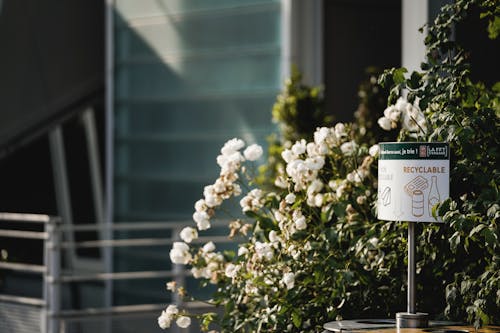 ©Pauline Ballet / FFT
©Pauline Ballet / FFTHaving embarked on a low-carbon trajectory, Roland-Garros is working on reducing its carbon footprint by way of four key approaches and is also contributing to projects that promote biodiversity in France thanks to the support of all of its stakeholders.
1) Promoting sustainable and soft mobility
A survey carried out in 2018 showed that 72.2% of spectators travelled to the stadium on transport that emitted low levels of greenhouse gases or none at all (public transport, on foot, by bike, etc.). However, 21.1% came in their car (vehicle’s average occupancy: 2.85 people) and 6.7% in transport such as a taxi or ride-sharing vehicle.
In order to support more sustainable mobility, Roland-Garros has set up several initiatives:
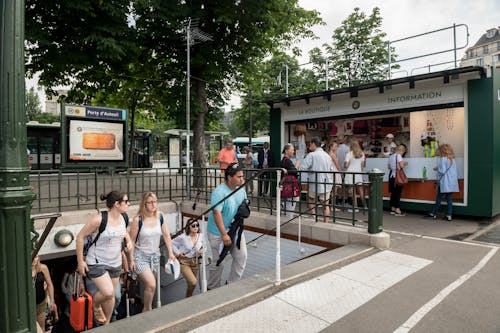 ©Amelie Laurin / FFT
©Amelie Laurin / FFT2) Contributing to the development of renewable energies
Since April 2016 and for all of its sites (National Training Centre, Jean-Bouin, Roland-Garros), the FFT has been supplied with 100% renewable french energy from ENGIE.
This year, in addition to the mobile charging stations – some of which are powered using “classic” solar power – the FFT and ENGIE are installing innovative organic and flexible solar panels. A study is being carried out to develop the stadium’s energy self-consumption on a wider scale.
What is more, since 2006 the FFT’s energy has been supplied exclusively by the “green” Enedis network; generators have been installed as a back-up, in the event of power cuts.
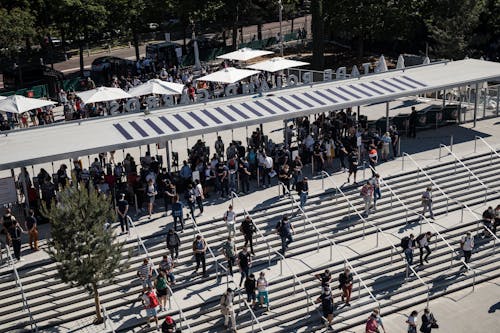 ©Amelie Laurin / FFT
©Amelie Laurin / FFT3) Promoting and offering sustainable food in the stadium
In partnership with Yann Arthus-Bertrand’s GoodPlanet Foundation, the FFT is working with all of the tournament’s restaurants and caterers on a sustainable nutrition plan, with the aim of offering products that are ever more responsible, something that is necessary in face of the climate crisis: certified, seasonal, locally-sourced, etc.
The food served to the general public includes a range of food products certified “Better for the climate”. The products with this label have a low carbon impact, according to the criteria rigorously defined with the GoodPlanet Foundation. Roland-Garros will also display the Eco-score label on products in some of the public catering areas.
On 5 June, World Environment Day, the food served in the hospitality areas will be 100% sustainable.
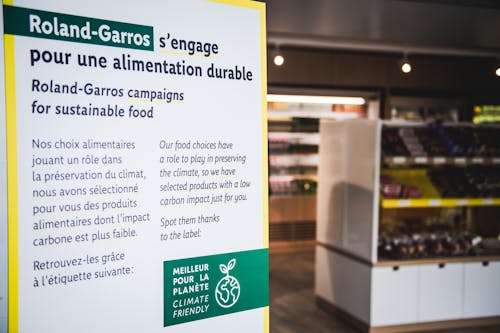 ©Pauline Ballet / FFT
©Pauline Ballet / FFT4) Promoting a circular economy
Since 2014, the FFT has rolled out a project to fight food waste, organised by the Le Chaînon Manquant charity. Any untouched food will be redistributed to various organisations in Paris that help disadvantaged people. This operation could not exist without the active involvement of the tournament’s caterers, Potel et Chabot, Paris Society and Sodexo. During the 2022 tournament, the equivalent of more than 5,133 meals were redistributed.
Beyond this project, which has a strong social impact, Roland-Garros is continuing to carry out actions to promote a circular economy.
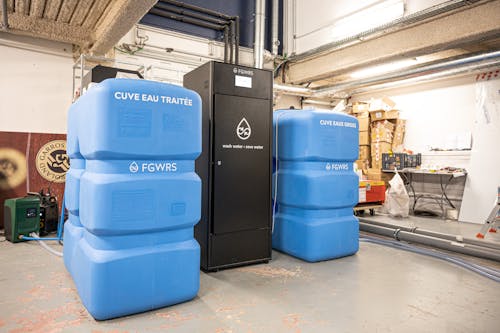 ©Christophe Guibbaud / FFT
©Christophe Guibbaud / FFT1) Collective eco-contributions made via the #Tennis4Climate movement
Initiated at the 2020 tournament, the #Tennis4Climate movement is being extended in 2023. For the fourth year in a row, Roland-Garros is getting involved in the Climate Plan implemented by the Provence-Alpes-Côte d’Azur region and the French National Forestry Commission, by donating to reforestation projects in areas affected by climate change, in a bid to help these forests adapt.
The partners, players and ballkids all contribute to this programme, which will help finance projects in the La Madone and Bueil forests (Alpes-Maritimes), following on from the projects financed in the Belvédère forest (2020), the Toulourenc forest on Mont Ventoux (2021), and the Contadour massif in Provence (2022).
The public can also contribute by adding a €0.50 donation when paying for their purchases in the catering areas and La Griffe store.
“The FFT is very proud to be involved in the Provence-Alpes-Côte d’Azur region’s Climate Plan and to be part of this superb initiative. This reforestation project is a concrete illustration of the FFT’s commitment to helping the environment, particularly through the events that the federation organises,” announced Gilles Moretton, President of the French Tennis Federation.
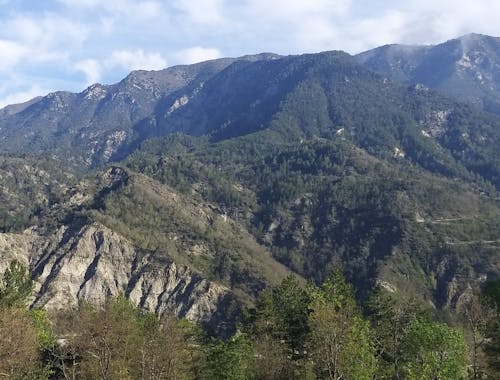 ©Lionel Blanc
©Lionel Blanc2) Preserving biodiversity inside the stadium
The project to modernise Roland-Garros stadium included a desire to improve local biodiversity and the site’s ecological role with an ecological management plan designed by a professor from the French Natural History Museum. This plan was rolled out over the five years of building work.
As an example, the local fauna has been preserved: natural borders have been created to connect the Bois de Boulogne up with the city’s parks. The installation of insect hotels will encourage a variety of insects – some new, some already on site – to make the stadium their home. These insect hotels, which are specifically adapted to the species already present on the site, join the 21 beehives tended year-round on the FFT’s sites, including the roof of the Club des Loges and the Village. This initiative helps maintain the local bee population as well as boosting the reproduction of certain plants, thanks to the bees’ role in pollination.
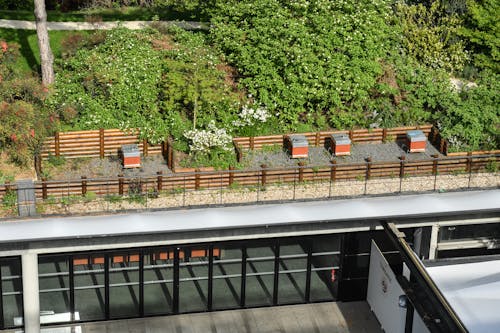 ©Christophe Guibbaud / FFT
©Christophe Guibbaud / FFT1) An ever more accessible and inclusive tournament
With the aim of making Roland-Garros tournament more open, more inclusive and more accessible - and with the support of its official sponsor BNP Paribas and for the second year running -, the FFT is offering tickets priced at just €10 for spectators under 25. During Opening Week, 2,500 tickets will be gifted to charities that work with the FFT and its partners. And on the first Sunday of the main tournament (28 May), during the night session on Philippe-Chatrier court, a charity match will be organised by BNP Paribas and seats will be reserved for charity organisations. Thanks to these initiatives, 18% of all tickets to Roland-Garros are inclusive, with 85,000 tickets priced at under €20.
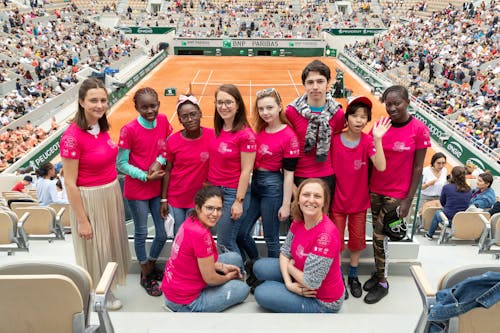 ©Jean-Charles Caslot / FFT
©Jean-Charles Caslot / FFT2) A tournament that is ever more accessible to people with specific needs
Providing a suitable reception for disabled spectators and visitors with reduced mobility is one of the tournament’s priorities. As the work on the new Roland-Garros stadium progressed, various facilities were incorporated to improve the reception of people with reduced mobility.
As an example, Philippe-Chatrier court now has more than 50 seats for people with reduced mobility. Various services are provided in the stadium over the tournament fortnight:
In order to respond to the standards set out in the accessibility policy and to improve the reception of spectators with specific requirements, every year the FFT organises a day of discussion with experts and members of associations that work with people with disabilities.
This year, the FFT and its partner Orange are implementing a new system for following the matches, Sound for All, an audio immersion tool that is easy to access and offers high-quality sound. It records all the different sounds to recreate the atmosphere on the court, with the addition of commentary and stereophonic (“left-right”) features, via an audio broadcasting system that is accessible using headphones and a smartphone. Originally designed for severely sight-impaired and sight-impaired tennis fans, it is now available to everyone.
Another new feature this year is that the tournament organisers have set up a quiet room, a space where anyone who needs a break from the crowds can retreat.
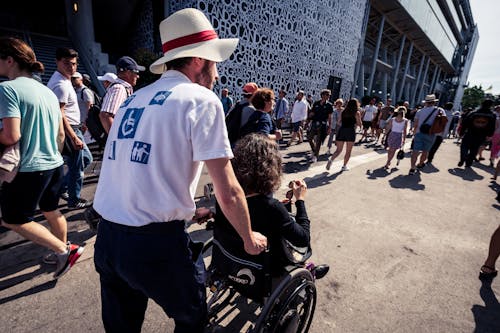 ©Amelie Laurin / FFT
©Amelie Laurin / FFT3) Actions to promote solidarity and community relationships
In addition to the tournament’s iconic charity actions, like Stars Set and Match sponsored by “Hair Rituel by Sisley” and Aces du Cœur sponsored by BNP Paribas, a number of new initiatives are being rolled out for this year’s tournament. Since 2020, a charity donation box set up in the players’ locker rooms on Philippe-Chatrier court has allowed the players and ballkids to donate any unwanted sports equipment, which is then collected by the Emmaüs Solidarité charity and redistributed to people in need. More than 1,000 items of sports equipment were collected in 2022.
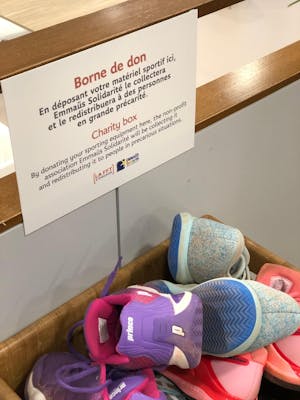
The traditional charity day, created in 1977 and renamed “Yannick Noah Day” this year, will take place on 27 May. Like in previous editions, the day’s proceeds (€250,000 in 2022) will help to:
Since 2020, the FFT has sold a series of lovely tournament photographs. The photographs are on sale in the online store and the La Griffe boutique. All proceeds from their sale will go to associations that support the development of tennis in France and abroad through social, philanthropic, educational, cultural and environmental projects via the FFT Terre d’Impact endowment fund (the FFT endowment fund is an independent structure dedicated to philanthropy and patronage). This year, Terre d’Impact will also benefit from the sale of pots of honey from the beehives set up on the various Roland-Garros sites.
Throughout the fortnight, Roland-Garros is rolling out a campaign to raise public awareness via videos shown inside the stadium, on the courts and on social media.
The Green Teams sponsored by ENGIE will once again be present inside the stadium grounds to raise the spectators’ awareness about eco-friendly habits and sustainable development, by presenting the various actions rolled out.
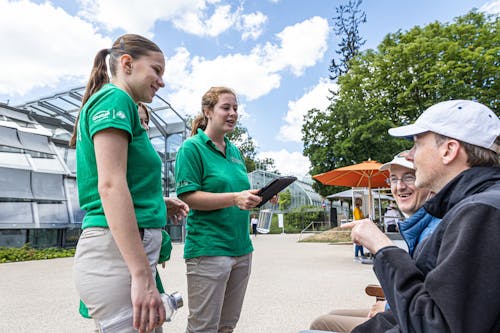 ©Emilie Hautier / FFT
©Emilie Hautier / FFTA stand to raise awareness about ecology thanks to the Fresque Ecologie du Tennis game. This educational team game, developed by the FFT, is designed to raise tennis fans’ awareness about environmental issues while suggesting concrete solutions with which participants will be invited to get involved.
A sustainable development quiz will be posted online on the first day of the tournament to raise Roland-Garros fans’ awareness in a fun way about the tournament’s eco-responsible actions. Participants will be in with a chance of winning two tickets for the men’s or women’s singles final at Roland-Garros 2024.
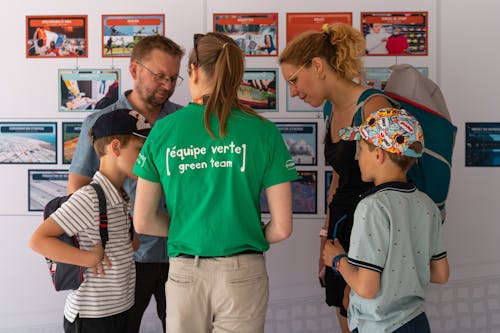 ©Johan Sonnet / FFT
©Johan Sonnet / FFTRoland-Garros will celebrate World Environment Day on 5 June. On this day, communications about sustainable development will be stepped up and a digital treasure hunt, the Green Tour, will be organised in the stadium grounds, allowing participants to enter a draw for the chance to win two tickets for the 2024 Roland-Garros final of their choice.
In 2022, 12,000 spectators learnt more about ecology during the tournament.
The Wheelchair tennis tournament is being stepped up this year. The singles draws have been increased from 12 to 16 players each, and one of the finals will be played on Philippe-Chatrier court and broadcast live on France Télévisions.
On Friday 9 June, “All in a Wheelchair” day will take place. This event, sponsored by The Adecco Group since 2014, enables people with a disability and non-disabled spectators of all ages, whether they already play tennis or not, to learn more about wheelchair tennis.
This year, the tournament will also raise awareness about people with hearing impairments on this day. On Saturday 10 June, exhibition matches by France’s Deaf/hearing-impaired tennis team – including the gold medallists from the latest Deaflympics, Mickaël Laurent and Vincent Novelli – will be organised to raise awareness about this up-and-coming discipline.
This demonstrates the tournament’s commitment to making eco-responsibility part of the tournament’s DNA for the long term.
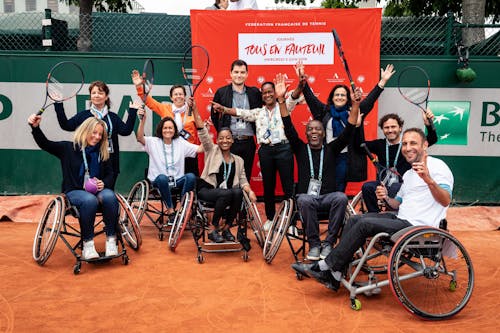 ©Amelie Laurin / FFT
©Amelie Laurin / FFTIn May 2014, Roland-Garros became the first international sporting event in France to hold the ISO 20121 certification (responsible event), confirming the tournament’s commitment to eco-responsibility for the long term and making it part of the tournament’s DNA.
In partnership with the French Ministry of Sports and the WWF, back in January 2017, Roland-Garros signed a charter of 15 eco-responsible commitments for sporting events, which is based on ambitious and quantifiable objectives.
What is more, the FFT joined the Sports for Climate Action movement, initiated by the UNFCCC (United Nations for Climate Action) and supported by the IOC, when it was created in December 2018. This movement appeals to sports organisers, and particularly the organisers of major international sporting events, to encourage them to take an active role in fighting climate change.
Finally, in November 2019, the FFT signed the Paris Action Climat charter, and has made a commitment, alongside the City of Paris, to reduce its emissions in order to fulfil the ambitions of the Paris Agreement.